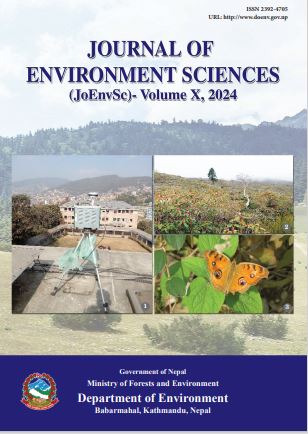Estimation of Greenhouse Gas Emission from Municipal Solid Waste Management Techniques - A Case of Rampur Municipality, Palpa District, Nepal
DOI:
https://doi.org/10.3126/jes.v10i1.66965Keywords:
Climate Change, Composition, Emission, Generation, MitigationAbstract
This paper explores the rising global solid waste issue and its often-overlooked contribution to climate change. Most studies view waste as a significant parameter of public health and aesthetic value but neglect its role in climate change. Focusing on Rampur municipality, the study quantifies waste from households, commercial hubs, and institutions, using IPCC guidelines for greenhouse gas emission estimates. The waste generated by 84 households, 26 commercial hubs, and 14 institutions for seven consecutive days was studied and quantified. The IPCC's 2006 Guidelines for National GHG Inventories were applied to estimate GHG emissions from landfills and composting. In Rampur municipality, 2772 tons of waste was generated and only 40 % of the generated waste was landfilled. The generation rates of Households, Commercial, and Institutions were 141.5 ± 7.16 g/capita/day, 1933 ± 0.32g/ day, and 826 ± 0.46 g/day respectively. Organic waste emerges as a key contributor in Households and Commercials while Paper dominates institutions. Rampur Municipality emits approximately 2,629.77 tons of CO2eq GHG annually from waste management, divided as 0.06 tons of CO2eq GHG annually per individual, with households contributing 55%, commercial sectors 41%, and institutions 4%. Furthermore, composting was identified as an effective mitigation strategy, potentially reducing emissions by 81%. Overall, this research sheds light on the significant contribution of municipal waste to GHG emissions. It underscores the need for enhanced waste management strategies, particularly emphasizing composting's role in global climate change mitigation. It can be useful for policymakers to address waste-related emissions.




